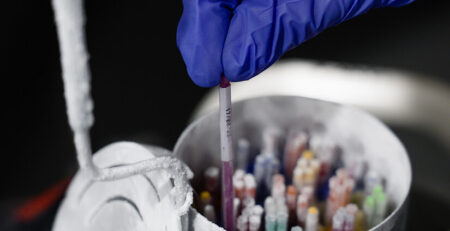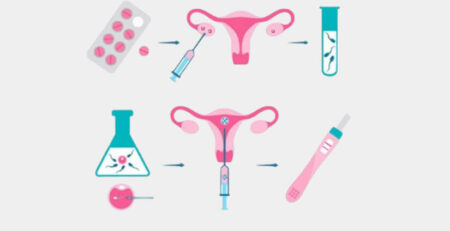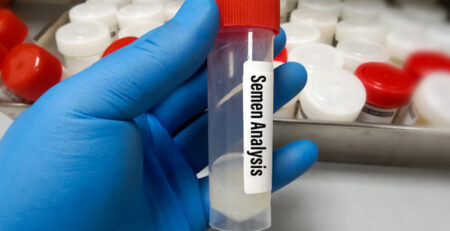Third Party Reproduction
Third party reproduction or donor-assisted reproduction is a process in which the DNA or gestation is provided by a third party, known as the donor(s) other than the one or both parents. The third party involvement is limited only to the reproductive process and doesn’t extend into raising the child at all. Couples unable to reproduce naturally due to any abnormalities or disorders, or same-sex couples or a person without a partner, use third-party reproduction procedures.
Egg Donor
The egg donation is the process in which a woman donates her eggs to enable another woman with poor quality eggs to conceive as a part of assisted reproduction technology (ART). The egg donation typically involves in-vitro fertilization technology in which the eggs are fertilized in the laboratory for immediate use or to be frozen and stored for later use. The details of the egg donor are kept confidential.
Step 1:
The couple chooses the egg donor either themselves or through the clinic. It is advisable to do an extensive medical, psychological and genetic screening of the donor.
Step 2:
Once the donor is selected, both the woman and the egg donor are given Lupron to sync the reproductive cycles, to make sure that the donor’s ovulations is at the same time when the woman’s uterus is ready for the embryo.
Step 3:
The donor will be given injections to help mature the eggs for fertilization, while the woman will be given estrogen & progesterone to prepare the lining of the uterus for pregnancy.
Step 4:
Once the donor’s eggs are mature, they will be collected under ultrasound monitoring. At the same time, sperm specimen will be collected and combined with the donor’s eggs in a laboratory.
Step 5:
In 4-5 days, the embryos will develop and will be inserted into the woman’s uterus. To increase the success rate, 2-3 embryos are inserted. This, however, can lead to multiple pregnancies. Good quality embryos can be frozen for future use.
A pregnancy test is taken 2 weeks after the procedure.
Sperm Donor
A donor sperm is used when the male partner has no sperm, poor quality sperm, sperm with poor mobility or a genetic problem that the child could inherit from the male partner. Single women who want a biological child also use donor sperm. Donor sperms can be used for intrauterine insemination (IUI) if there is no other indication for in vitro fertilization for female causes else for in vitro fertilization if female factor exists.
A couple may select a sperm donor on their own or through sperm banks & fertility clinics. The donor sperm can be selected on the basis of donor’s characteristics such as looks, race, academic ability, personality, family medical history etc.
The nature & course of the pregnancy is same as one achieved with sexual intercourse and the male sperm donor will be the biological father, but not the legal father of the child. The personal details of the donors are kept confidential by the bank.
The donor selected through sperm banks are thoroughly checked for:
- Any infections such as HIV, hepatitis B, Hepatitis C, Gonorrhea, Syphilis etc. that can be transmitted via semen to the women.
- Any blood transfusion by the donor or his sexual partner within the past one-year.
- History of homosexual activity, multiple sexual partners or a history of IV drug use or genital herpes.
Success Rate of Pregnancy using Donor Sperm:
Women, who have no infertility problems and are under the age of 35 years, have the highest success rate with this procedure. On average this procedure has 60-80% success rate but achieving pregnancy may take few cycles.
Embryo Donor
In some cases where the quality of male sperm is also not good along with poor egg quality of a woman, donor embryo transfer can be considered that combined the sperm of a sperm donor and eggs of an egg donors and then insert the embryo directly into the woman’s uterus after preparing the endometrial lining with hormones (oestrogen and progesterone).
Surrogacy Treatment
The word surrogate originates from Latin word Surrogates which means substitution or ‘to act in the place of’. Surrogacy means when a woman undergoes a pregnancy and gives birth to a baby for another woman using the egg of that women and sperm of her husband.
In this the egg and the sperm of the genetic couple are used. The egg of the woman is fertilized with her partner’s sperms using IVF/ICSI techniques and transferred to surrogate’s uterus. The surrogate carries the pregnancy for nice months, however, the child born is not genetically linked to the surrogate.
Surrogacy is opted by:
- Women who don’t have a uterus but their ovaries produce eggs. For example in case of congenital absence of uterus, known as Mullerian Agenesis or due to surgical removal of uterus due to other medical issues such as cancer, severe hemorrhage etc.
- Women with malformed uterus or damages uterus
- Women with high risk of uterus rupture due to previous uterine surgeries for fibroid or rupture uterus.
- Women who are unable to carry a pregnancy to term and have repeated miscarriages.
- Women who have had repeated failed IVF cycles
- Women suffering from medical issues like diabetes, kidney diseases or for those whose overall health is good but pregnancy can be life-threatening.
- Women with Rh incompatibility.







